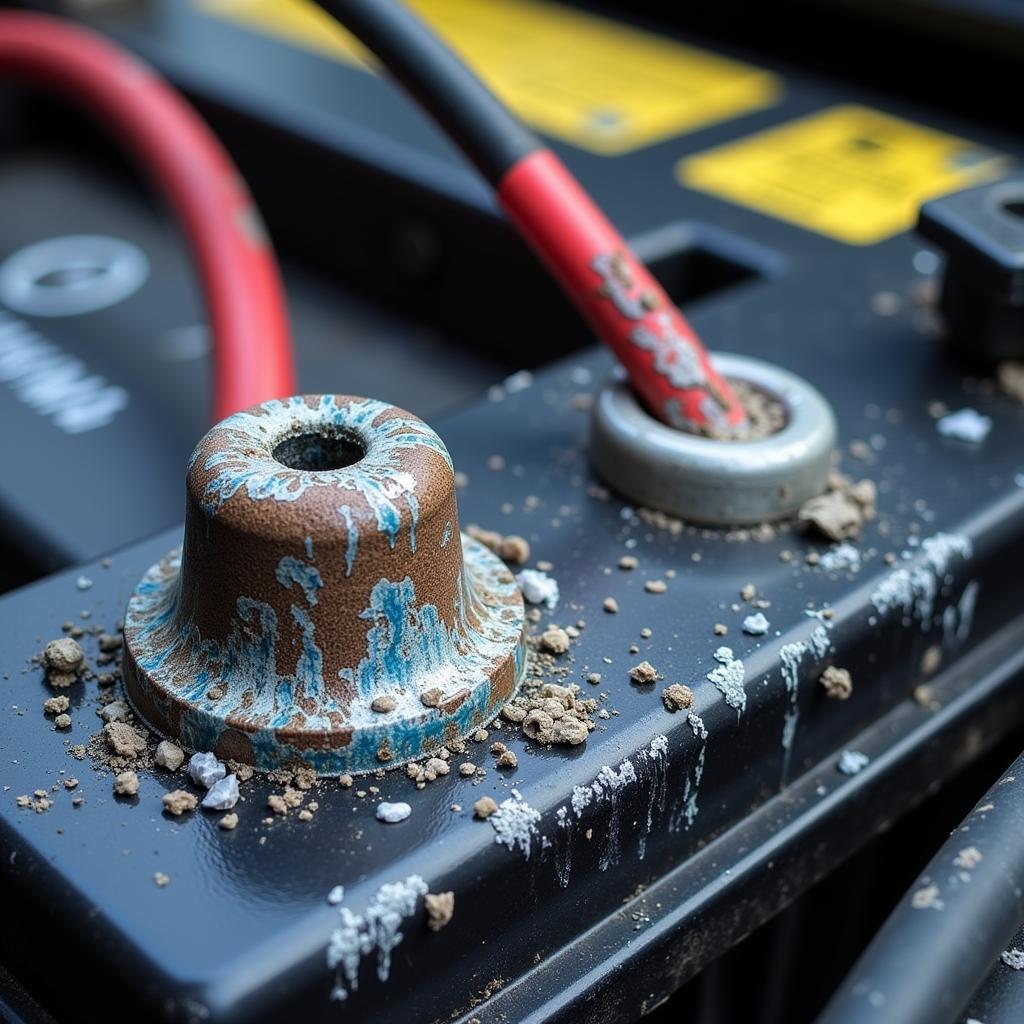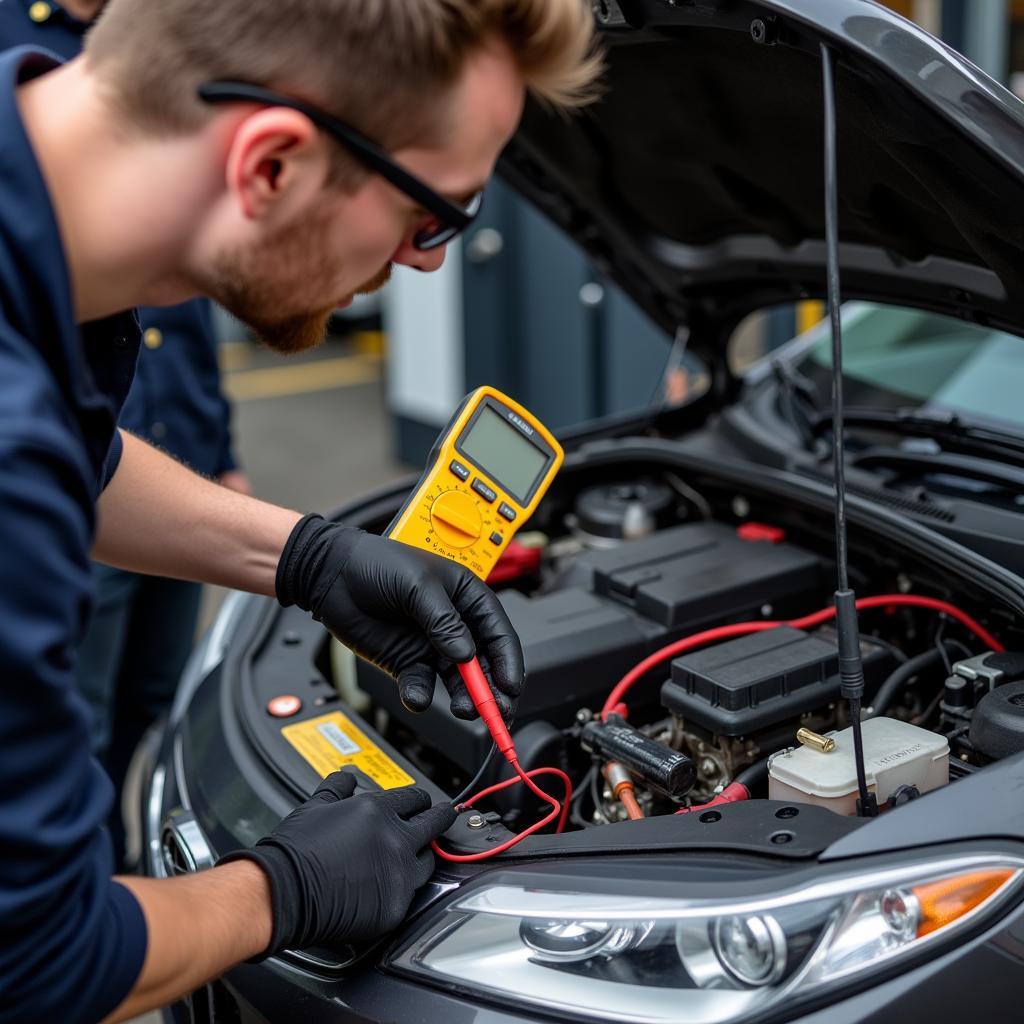Car Says Service Battery Charging System: What Does It Mean?
Imagine cruising down the road, enjoying your favorite tunes, when suddenly, a daunting message flashes on your dashboard: “Service Battery Charging System.” What does it mean? Should you pull over immediately, or is it something you can address later?
This article dives deep into the reasons behind this ominous warning, explores potential causes, and guides you on the next steps to ensure your safety and prevent costly repairs.
Decoding the “Service Battery Charging System” Warning
The “Service Battery Charging System” message is your car’s way of saying something’s amiss with its electrical power generation and storage. This complex system, responsible for starting your engine and powering various electrical components, relies on a delicate balance. When this balance is disrupted, the warning appears, signaling potential issues that require immediate attention.
Common Culprits Behind the Warning
Several culprits can trigger the “Service Battery Charging System” warning, ranging from minor hiccups to significant malfunctions:
- Dying Battery: Your car battery, with a typical lifespan of 3-5 years, is often the primary suspect.
- Faulty Alternator: This vital component recharges the battery while driving. If it fails, your battery won’t get the juice it needs.
- Loose or Corroded Battery Cables: Like a clogged artery restricts blood flow, corroded or loose battery cables hinder the electrical current, causing charging issues.
- Failing Voltage Regulator: This component, often integrated within the alternator, manages the voltage flowing from the alternator to the battery. Malfunctions here can lead to overcharging or undercharging the battery.
- Wiring Problems: Worn-out or damaged wiring within the charging system acts as a roadblock, disrupting the flow of electricity and impacting battery charging.
 Loose and Corroded Battery Cables
Loose and Corroded Battery Cables
What to Do When You See the Warning
Seeing the “Service Battery Charging System” warning can be unsettling, but panicking won’t help. Here’s what you should do:
- Assess the Situation: Is the warning light steady or blinking? A steady light usually suggests a less severe issue than a flashing one.
- Check for Immediate Issues: Are your headlights dimming? Is the engine struggling to turn over? These are signs of a severely depleted battery requiring immediate attention.
- Head to a Mechanic: Don’t delay seeking professional help. Driving with a faulty charging system can leave you stranded and potentially damage other electrical components.
Diagnosing the Problem: What to Expect at the Mechanic
A skilled mechanic will employ various diagnostic tools and techniques to pinpoint the root cause of the “Service Battery Charging System” message:
- Visual Inspection: They’ll begin by examining the battery, cables, and alternator for visible signs of damage, corrosion, or loose connections.
- Battery and Alternator Testing: Specialized equipment will be used to assess the battery’s health and the alternator’s charging capacity.
- Voltage Regulator Check: The mechanic will test the voltage regulator to ensure it’s functioning correctly and maintaining optimal voltage levels.
- Wiring Inspection: A thorough inspection of the wiring harnesses associated with the charging system will help identify any frayed, broken, or damaged wires.
 Mechanic Testing Car Battery
Mechanic Testing Car Battery
Preventing Future Charging System Problems
Prevention is always better than cure. Here are some proactive measures to keep your car’s charging system healthy:
- Regular Battery Maintenance: Inspect your battery regularly for signs of corrosion, clean the terminals, and ensure the cables are securely fastened.
- Timely Battery Replacement: Don’t wait for your battery to completely die. Replace it proactively every 3-5 years or as recommended by your car manufacturer.
- Address Warning Signs Promptly: Never ignore dashboard warning lights, especially those related to the battery or charging system. Early detection can prevent more severe problems down the line.
car service near me schererville
Understanding the Importance of a Healthy Charging System
“A well-maintained car battery is not just about starting your engine; it’s the heart of your car’s electrical system,” says John Smith, a senior automotive electrician with over 20 years of experience. “Neglecting your battery and charging system can lead to inconvenient breakdowns, costly repairs, and even safety hazards.”
A robust charging system ensures:
- Reliable Engine Starting: A healthy battery provides the initial power surge needed to crank the engine and get you moving.
- Optimal Electrical System Performance: Your car’s various electrical components, from headlights and radio to power windows and safety systems, rely on a steady power supply from the charging system.
- Prevention of Costly Damage: A malfunctioning charging system can strain other electrical components, potentially leading to expensive repairs.
Conclusion
The “Service Battery Charging System” warning, though daunting, doesn’t have to spell disaster. Understanding its implications, addressing the issue promptly, and adopting preventive measures can save you from frustrating breakdowns and costly repairs. Remember, regular car maintenance, including a keen eye on your charging system, is crucial for a smooth and safe driving experience.
FAQs
Q1: Can I jump-start my car if the “Service Battery Charging System” warning is on?
While jump-starting might get your engine running temporarily, it’s crucial to understand that it doesn’t address the root cause of the warning.
Q2: How much does it cost to fix a car battery charging system problem?
The repair cost varies depending on the specific issue. A simple battery replacement might be relatively inexpensive, while a faulty alternator replacement can be more substantial.
Q3: How often should I have my car battery checked?
It’s generally recommended to have your battery checked at least once a year, or more frequently if you live in extreme weather conditions.
Q4: Can a bad battery damage my car’s alternator?
Yes, a failing battery can put extra strain on the alternator, potentially leading to premature failure.
Q5: What are some signs of a dying car battery?
Common signs include sluggish engine cranking, dimming headlights, clicking sounds when turning the key, and the “Service Battery Charging System” warning itself.
Still Have Questions?
If you require further assistance or have more questions about your car’s charging system, please don’t hesitate to contact us.
Contact us via:
WhatsApp: +1(641)206-8880
Email: [email protected]
Our team of car experts is available 24/7 to provide you with the support you need.

